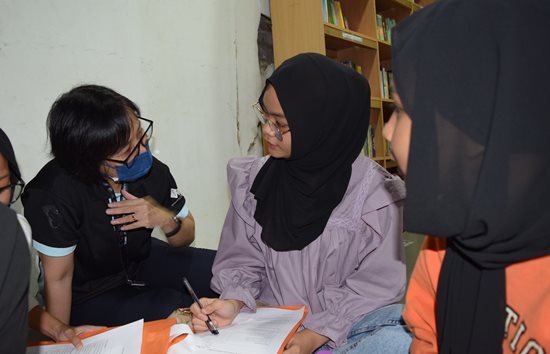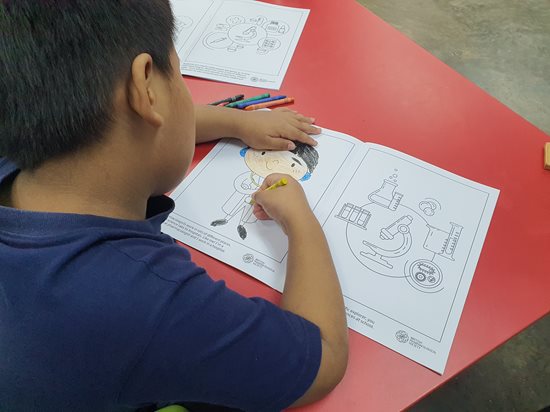Imagine yourself as someone in a situation where you are a refugee or in an underprivileged community, your primary and secondary education is unstable, and your university education is but a dream. Your parents are always having financial difficulties and illnesses are not considered reasons to visit a clinic or hospital. With an unstable education and challenges accessing basic needs, health education is not a topic that can be easily reached.
I applied for the engagement grant from the British Pharmacological Society in 2022 intending to provide health education and awareness programmes for such communities, hoping that together we could make small yet impactful changes for the community. Delightfully, the engagement grant of £667 was approved in December 2022. Working closely with International Medical University (IMU Cares), two refugee communities were identified for this initiative. IMU Cares is the Community Engagement Office of the IMU, Malaysia. For many years IMU Cares has contributed positively to the lives of refugees living in Malaysia particularly in the area of health and education.
The first community visit was completed at the Yayasan Chow Kit (YCK) community, a non-profit organisation in Kuala Lumpur, which is a 24-hour crisis and drop-in centre providing meals, activities, therapy, case management and educational programmes for at-risk children and teenagers. Our initial plan was to provide health education and community engagement activities on “medication safety” with some interactive activities. The target group is teenagers around the area.

60 students participated in the “Medication Safety and Reproductive Health: Education and Awareness Programme for the Community” at the YCK.
The community leader from the YCK requested additional reproductive health education in addition to our medication safety education programme. Therefore, on May 27, 2023, we delivered the project titled “Medication Safety and Reproductive Health: Education and Awareness Programme for the Community” to the YCK. A total of 60 students participated in the programme, mostly teenagers, in secondary education. We split the participants into small groups, and they had to go around stations covering topics, such as how drugs are developed and discovered, why vaccinations are important, what happens when we take drugs, whether can we take drugs with food or drinks, if the effects of drugs are always positive, is self-medication beneficial, what is drug addiction, and sexual health education for teenagers.
Pharmacologists, public health specialists, psychologists and psychiatrists, and post-graduate and undergraduate students from the International Medical University, Malaysia participated as a team working in logistics, preparation, transportation, delivering the content and taking care of the participants around the stations. We provided lunch to the participants, facilitators, and the home's caregivers during the day, and also issued goodie bags for the children. Overall, the participants enjoyed the day, and even after the programme ended, we noticed one child sitting with psychologists to discuss his issues.
The Children's Training Centre (CTC), a school for refugees in Kuala Lumpur, was the site of our second visit, which is one of the Kuala Lumpur’s refugee communities. This centre, like other centres, offers mainly free education to the children of refugees. The main challenges of the refugee community are the uncertainties of healthcare and future education. At the same time, the growing number of teenagers in families lack awareness of reproductive health issues, and there are risks of substance abuse in the community.

A young participant at the CTC explores science with a BPS colouring book.
On September 2, 2023, our programme "Medication safety, Reproductive Health and Crafting the Authentic Self: Education and Awareness Programme for the Marginalized Community" took place. This visit built on our experience of the first event, drawing upon the lessons learned throughout the day. In the morning, the children were divided into four groups and rotated around four stations. A challenge this time was to avoid the exhaustion of facilitators, comprising of not only pharmacologists but also pathologists, public health specialists, microbiologists, biochemistry specialists, internal medicine physicians and undergraduate medical students. Upon the community leader’s request, drug addiction issues and reproductive health education were also brought into the programme. Primary age children also participated, and they were given a separate task using crayons and colouring books provided by the BPS.
The IMU psychology team contributed to the programme with the “Crafting the Authentic Self” activity to help participants to find their inner strength and motivation. This programme had an additional feature for motivating the refugee children and finding on inner strength. Breakfast and lunch were provided for the student participants, caregivers, the volunteers, and goodie bags were also provided for the children. The team, including me, gathered anonymous written feedback from the children, which included their heartfelt appreciation, remarks, and some heartbreaking wishes. We planned some activities, pictures, interesting videos, and two-way discussions to ensure that the sessions were engaging. In consideration of the culture, the groups were split into boys and girls for programmes on reproductive health education.
All in all, I have no doubt that these two IMU Cares visits, with the support of the engagement grant by the British Pharmacological Society, will have a positive impact beyond the participants or students. Other underprivileged community home leaders expressed their great interest in conducting a similar activity in their communities as well.
We are much obliged to the British Pharmacological Society for this engagement grant, and to the International Medical University for supporting this initiative and programme as a part of the existing IMU Cares programme. Applying for an engagement grant could also help you develop high quality, in person or digital engagement and outreach activities that will reach a variety of public audiences. Together we can make a better world, bit by bit!
Comments
If you are a British Pharmacological Society member, please
sign in to post comments.